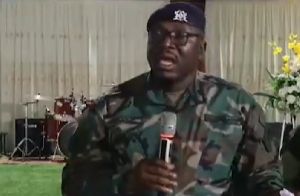In Honour of Dr Kwame Nkrumah: Africa’s True Patriot (II)
To most sub-Saharan Africans and Ghanaians in particular, Kwame Nkrumah is revered, almost hero worshipped. A brilliant orator, master tactician and a great philosopher, Nkrumah envisaged African unity long before many of the continental Africans (from Bamako to Cape Town) who voted him “The Greatest African of the 20th Century” were born. Kwame Nkrumah’s footprints are still blueprint for Continental Africans to follow.
A brilliant philosopher and scholar, he rose to the forefront of the Pan African (ahead of such greats as, Marcus Garvey, Edward Wilmot Blyden, W.E.B. Du Bois, George Padmore, Casley Hayford and other great intellectuals) struggle to free Continental Africans from colonialism.
The sixth Pan African Congress held in Manchester, England in 1945, which focused on the promotion of African independence from colonialism, brought Kwame Nkrumah to the fore. Kwame Nkrumah single-handedly achieved African independence, but his focus on political and economical unification of the continent earned him many enemies in the west. Indeed many western leaders of that era referred to him variously as ‘communist’, ‘lunatic’, etc.
From his early years in his homeland, then in United States and later in England, Kwame Nkrumah uncompromisingly fought for the cause of the common people “ the poor blacks in United States”, “The veranda boys and girls in his homeland” and the poor peasants across sub-Saharan Africa.
Among the future continental African leaders at sixth Pan African Congress, including Jomo Kenyatta, S. Akintola, Obafemi Awolowo, Namdi Azikikwe, Wallace Johnson and others, Kwame Nkrumah was seen as the anointed one and successor to honourable Marcus Garvey. Kwame Nkrumah was the best showman among them, due to his immaculate dressing, his fluency and command of the English language. In addition, he was exceedingly clever, handsome and colourful. He was the show boy of the Pan African Movement during the period in question and became the ‘ambassador of African independence movement’. It was the Manchester congress that the Pan African banner of Red, Gold and Green with the Black Star in the middle was officially adopted as the flag of Africa. Kwame Nkrumah dominated the 6th Pan African Congress with his battle cry call for “Independence Now”.
Padmore, Du Bois, Casley Hayford, Azikikwe, Kenyatta, Blyden and other Pan African Leaders all acknowledged after the Manchester Congress that the freedom and self dignity of the entire black Africans (Continental and Diaspora Africans) was in the hands of Kwame Nkrumah. The Prophecy of Honourable Marcus Garvey “that the one who will finally lead us to the motherland (continental Africa) will come from the continental Africa”.
Kwame Nkrumah returned to mainland Africa in1947 with the hope and aspirations of continental Africans and Africans in Diaspora on his young shoulder. A great organiser, his campaign of “Positive Action”, civil disobedience, non-cooperation, boycotts and strikes was very effective than violence. Kwame Nkrumah was far ahead of his time. What marked him from other great statesmen of his generation was that he correctly “predicted” that only through continental African unity that Africa could develop and prosper. In his book “Africa Must Unite”, Kwame Nkrumah demonstrates why continental development is essential for African progress. The sad events in Zimbabwe, Darfur and elsewhere on the continent vindicates Dr Kwame Nkrumah! United Nations did recognise his contribution to humanity and was posthumously given an award.
Like a prophecy, the crisis unfolding in Zimbabwe was predicted by Dr Kwame Nkrumah in his book “I Speak of Freedom: A Statement of African Ideology” he wrote, “It is clear that we must find an African solution to our problems, and that this can only be found in African unity. Divided we are weak, united; Africa could become one of the greatest forces for good in the world”.
Kwame Nkrumah was always pro people as his speech at the Old Polo grounds in Accra, Ghana at the dawn of independence attest to. At the dawn of 5th March 1957, Osagyefo Dr Kwame Nkrumah declared an independent Ghana. After the independence Dr Kwame Nkrumah worked hard to open up opportunity for millions of Ghanaians, from WA to Half Assin, every Ghanaian child was given the opportunity to go to school. Many children became the first in their family (including this writer’s father) to go to school. Many Africans from elsewhere on the continent who were still living under colonial rule were given free scholarship to either study in Ghana or abroad.
Dr Kwame Nkrumah’s dream and that of millions of Ghanaians was shattered on the early hours of 24th February, 1966 when his government overthrown by a bunch of criminals and recalcitrant army and police officers who were opposed to democracy and freedom.
Just over quarter of a century after his death, political leaders across the length and breath of the continent (including Ghana) invoke his name to ‘win’ elections. Although his vision of ‘United States of Africa’ was never realised, his name still dominates political and economic unity of Africa.
At the African Union summit in Accra, President Maummar al-Gadaffi of Libya emerged as the dominant organiser of African unity and proposed the formation based on Dr Kwame Nkrumah’s dream, of a United States of Africa. Gadaffi’s group became known as “The Instantists”. Among the proponents of this group include countries that suffered severed economic hardships, prolong civil war, oppression and exploitation.
However history may judge African’s foremost Patriot and the greatest African of the 20th Century, Kwame Nkrumah’s own contribution to history cannot be doubted. The intelligence community of the west have acknowledged that Kwame Nkrumah was perhaps the greatest and intelligent African statesman that ever lived.
Only few individuals have significantly altered the course of history. Among these few individuals is Osagyefo Dr Kwame Nkrumah, Africa’s true Patriot. Kwame Nkrumah can be credited for liberating a whole continent. He will forever dominate the politics, not only of his homeland Ghana, but continental Africa.



















